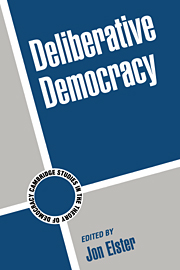Book contents
- Frontmatter
- Contents
- List of Contributors
- Preface and Acknowledgment
- Introduction
- 1 “Claro!”: An Essay on Discursive Machismo
- 2 Deliberation as Discussion
- 3 All Men Are Liars: Is Democracy Meaningless?
- 4 Deliberation and Constitution Making
- 5 Pathologies of Deliberation
- 6 Deliberation and Ideological Domination
- 7 Arguing for Deliberation: Some Skeptical Considerations
- 8 Democracy and Liberty
- 9 Health-Health Trade-offs
- 10 Full Representation, Deliberation, and Impartiality
- Index
10 - Full Representation, Deliberation, and Impartiality
Published online by Cambridge University Press: 05 June 2012
- Frontmatter
- Contents
- List of Contributors
- Preface and Acknowledgment
- Introduction
- 1 “Claro!”: An Essay on Discursive Machismo
- 2 Deliberation as Discussion
- 3 All Men Are Liars: Is Democracy Meaningless?
- 4 Deliberation and Constitution Making
- 5 Pathologies of Deliberation
- 6 Deliberation and Ideological Domination
- 7 Arguing for Deliberation: Some Skeptical Considerations
- 8 Democracy and Liberty
- 9 Health-Health Trade-offs
- 10 Full Representation, Deliberation, and Impartiality
- Index
Summary
How should we organize political systems in order to obtain impartial decisions? In the United States, I will assume, the Founding Fathers gave an answer to this question that was both normatively interesting and politically very appealing. According to them, impartial decisions required careful deliberation among representatives of the whole society. In brief, their “formula” for securing impartiality was “full representation plus deliberation.” In this sense, the two main obstacles to achieving impartiality in political measures were “hasty” decisions and “imperfect” or “incomplete” representation.
At the present time, I will also assume, the political system seems to have problems reaching impartial decisions and – probably because of that – finds it difficult to earn the public's respect. My guess is that these problems have at least one important cause: the political system (organized as it is) is unable to secure the full representation of society. During the framing of the U.S. Constitution, I think, the framers assumed that they had adequately solved this problem of representation, something that we can no longer assume.
My suggestion is that if we want to fulfill the criteria of both deliberation and full representation, we need to introduce substantive changes into the present representative system. If not, we will be relying solely on deliberation to achieve impartiality. That is, we will be demanding from deliberation alone something that, by itself, it cannot give us.
Information
- Type
- Chapter
- Information
- Deliberative Democracy , pp. 260 - 280Publisher: Cambridge University PressPrint publication year: 1998
Accessibility standard: Unknown
Why this information is here
This section outlines the accessibility features of this content - including support for screen readers, full keyboard navigation and high-contrast display options. This may not be relevant for you.Accessibility Information
- 24
- Cited by
